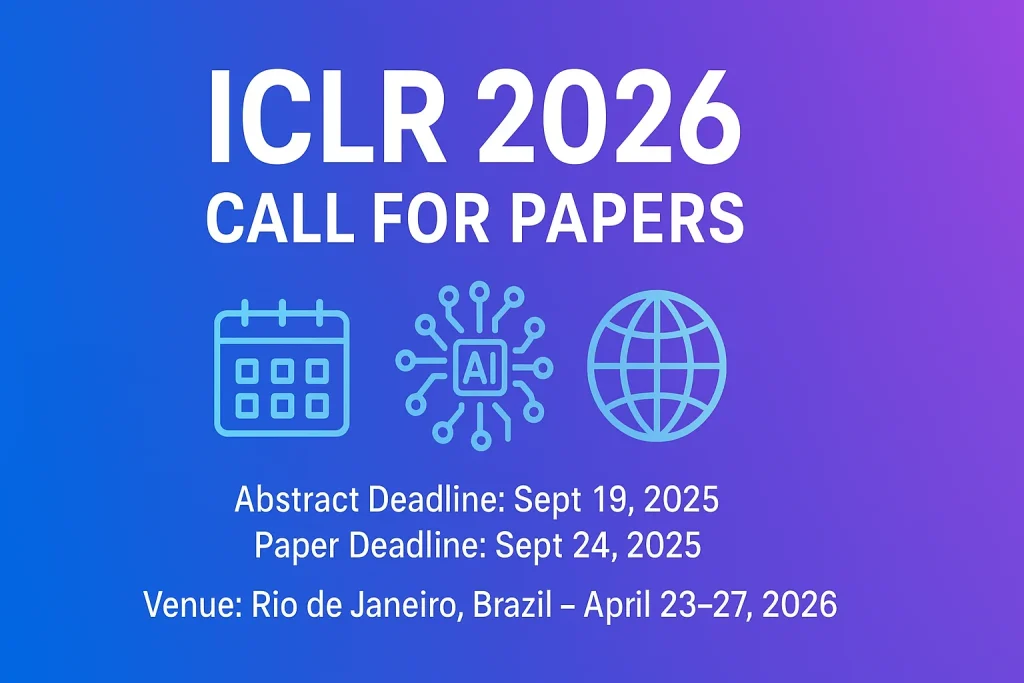ICLR 2026 in Brazil– Deadlines, Venue, Dates, and Call for Papers

The International Conference on Learning Representations (ICLR) is one of the world’s leading conferences on artificial intelligence and machine learning. Every year, it brings together top researchers, industry experts, and students to discuss advances in representation learning. ICLR has a strong reputation for being open, highly interactive, and focused on innovation in deep learning and AI research.
The upcoming ICLR 2026 will be the 14th edition of the conference, and it promises to be even bigger and more impactful. If you are planning to submit your work or attend, here is everything you need to know.
Venue and Dates of ICLR 2026
- Location: Rio de Janeiro, Brazil
- Conference Dates: April 23 – April 27, 2026
Brazil’s Rio de Janeiro will provide a stunning backdrop for the event, combining world-class research with a unique cultural and scenic experience. The city is famous for its beaches, festivals, and hospitality, making it an attractive venue for participants worldwide.
Important Deadlines for ICLR 2026
If you are planning to submit a paper, the deadlines are strict and must be followed carefully. All times are Anywhere on Earth (AoE) time zone.
- Abstract Submission Deadline: September 19, 2025
- Full Paper Submission Deadline: September 24, 2025
- Reviews Released to Authors: November 11, 2025
- Author–Reviewer Discussion Period: November 11 – December 3, 2025
- Discussion Ends: December 3, 2025
- Final Decision Notifications: January 22, 2026
It is important to note that abstract submission is mandatory. Authors who miss the abstract deadline cannot submit a full paper later.
For full details and submission info, Visit the event page.
Call for Papers (CFP)
ICLR 2026 invites researchers to submit papers in all areas of representation learning and related fields. Topics include but are not limited to:
- Neural network architectures and training methods
- Self-supervised, supervised, and unsupervised learning
- Reinforcement learning and decision-making systems
- Generative models and probabilistic approaches
- Optimization techniques for deep learning
- Transfer, meta, and continual learning
- Interpretability, fairness, privacy, and ethical AI
- Applications in vision, language, audio, robotics, healthcare, climate science, and beyond
One of the hallmarks of ICLR is its open review process. Submissions are made through OpenReview
Paper Submission Guidelines and Template
Authors preparing to submit to ICLR 2026 should carefully follow the submission guidelines:
- Papers must be anonymous (double-blind review). Do not include author names or affiliations.
- Submissions should not exceed 9 pages of main content. References do not count toward the limit.
- During the discussion phase, authors may add one extra page, making it up to 10 pages.
- Appendices and supplementary materials are allowed.
- Submissions must use the official ICLR 2026 LaTeX template.
The template ensures uniformity across submissions and can be downloaded from the ICLR website.
Review and Decision Process
Once a paper is submitted, it goes through a structured process:
Initial Reviews (November 2025): Reviewers provide feedback on novelty, technical soundness, and clarity.
Discussion Phase (Nov – Dec 2025): Authors and reviewers interact to clarify doubts, strengthen arguments, or correct errors.
Final Decision (January 2026): Accepted papers are notified, and authors prepare the camera-ready versions.
This open and interactive process makes ICLR unique compared to many other conferences. Authors get valuable feedback even if their paper is not accepted.
Workshops and Other Activities
Apart from the main conference, ICLR 2026 will host several workshops, tutorials, and poster sessions. Workshops provide a focused environment for niche topics, often sparking collaborations and new research directions.
The workshop proposal deadline is October 10, 2025, with notifications by December 1, 2025.
Workshops cover specialized areas like reinforcement learning applications, efficient AI, ethical AI, AI for healthcare, and many emerging fields.
Why Attend ICLR 2026?
- High Impact Research: ICLR is one of the top-tier conferences in AI/ML, with cutting-edge papers.
- Networking Opportunities: Meet leading experts from academia and industry.
- Global Participation: Researchers from every continent attend, making it highly diverse.
- Unique Location: Rio de Janeiro adds a cultural dimension to the scientific experience.
For students and early-career researchers, ICLR is also an excellent place to learn, collaborate, and showcase ideas.
Key Takeaways
- Venue: Rio de Janeiro, Brazil
- Dates: April 23 – 27, 2026
- Abstract Deadline: September 19, 2025
- Paper Deadline: September 24, 2025
- Final Decisions: January 22, 2026
- Template: Official ICLR 2026 LaTeX template (available on the conference website)
ICLR 2026 is set to be one of the biggest AI research events of the year. Submitting a paper, organizing a workshop, or simply attending, this is the place to connect with the global AI community. If hosting an AI-related event, don’t miss the opportunity to list your conference alongside ICLR 2026 to reach a wider audience.
Mark your calendars, prepare your submissions, and get ready to be part of ICLR 2026 in Rio de Janeiro.
FAQs
Q1. Do I need to submit an abstract before the paper?
Yes. Abstract submission is compulsory. Without an abstract, you cannot submit a full paper.
Q2. What is the page limit for papers?
9 pages for the initial submission. You may add one more page during the discussion, making it 10 pages. References do not count.
Q3. Can I include appendices or code links?
Yes. Appendices and supplementary materials are allowed. Sharing code is encouraged for reproducibility.
Q4. Is the review process blind?
Yes. The review is double-blind, meaning both authors and reviewers remain anonymous.
Q5. Can industry researchers also submit?
Absolutely. ICLR welcomes submissions from academia, industry, and independent researchers.
